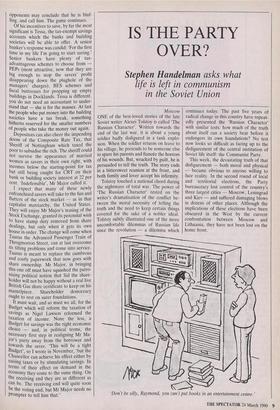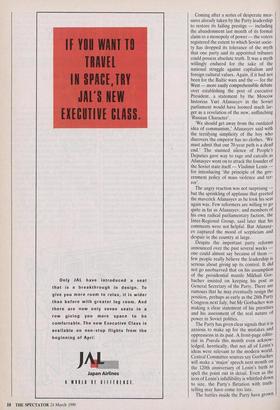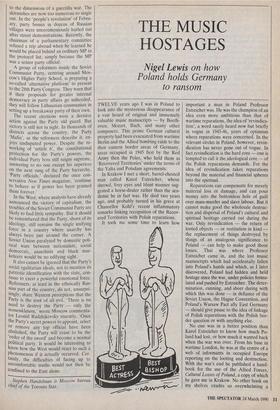IS THE PARTY OVER?
Stephen Handelman asks what
life is left in communism in the Soviet Union
Moscow ONE of the best-loved stories of the late Soviet writer Alexei Tolstoy is called 'The Russian Character'. Written towards the end of the last war, it is about a young soldier badly disfigured in a tank explo- sion. When the soldier returns on leave to his village, he pretends to be someone else to spare his parents and fiancée the horrors of his wounds. But, wracked by guilt, he is persuaded to tell the truth. The story ends in a bittersweet reunion at the front, and both family and lover accept his infirmity.
Tolstoy touched a national chord during the nightmare of total war. The power of `The Russian Character' rested on the writer's dramatisation of the conflict be- tween the moral necessity of telling the truth and the need to keep certain things covered for the sake of a nobler ideal. Tolstoy subtly illustrated one of the more uncomfortable dilemmas of Russian life since the revolution — a dilemma which continues today. The past five years of radical change in this country have repeat- edly presented the 'Russian Character' with similar tests: how much of the truth about itself can a society bear before it endangers its own foundations? No test now looks so difficult as facing up to the disfigurement of the central institution of Soviet life itself: the Communist Party.
This week, the devastating truth of that disfigurement — both moral and physical — became obvious to anyone willing to face reality. In the second round of local and territorial elections, the Party bureaucracy lost control of the country's three largest cities — Moscow, Leningrad and Kiev — and suffered damaging blows in dozens of other places. Although the implications of these elections have been obscured in the West by the current confrontation between Moscow and Lithuania, they have not been lost on the home front.
`Don't be silly, Raymond, you can't put books in an entertainment centre.' Coming after a series of desperate mea- sures already taken by the Party leadership to restore its failing prestige — including the abandonment last month of its formal claim to a monopoly of power — the voters registered the extent to which Soviet socie- ty has dropped its tolerance of the myth that one party and its appointed tribunes could possess absolute truth. It was a myth willingly endured for the sake of the national struggle against capitalism and foreign cultural values. Again, if it had not been for the Baltic wars and the — for the West — more easily comprehensible debate over establishing the post of executive President, a statement by the Moscow historian Yuri Afanasyev in the Soviet parliament would have loomed much lar- ger as a revelation of the new, unflinching `Russian Character'.
`We should get away from the outdated idea of communism,' Afanasyev said with the terrifying simplicity of the boy who discovers the emperor has no clothes. 'We must admit that our 70-year path is a dead end.' The stunned silence of People's Deputies gave way to rage and catcalls as Afanasyev went on to attack the founder of the Soviet state itself — Vladimir Lenin for introducing 'the principle of the gov- ernment policy of mass violence and ter- ror'.
The angry reaction was not surprising but the sprinkling of applause that greeted the maverick Afanasyev as he took his seat again was. Few reformers are willing to go quite as far as Afanasyev, and members of his own radical parliamentary faction, the Inter-Regional Group, said later that his comments were not helpful. But Afanasy- ev captured the mood of scepticism and despair in the country at large.
Despite the important party reforms announced over the past several weeks one could almost say because of them few people really believe the leadership is serious about giving up its control. It did not go unobserved that on his assumption of the presidential mantle Mikhail Gor- bachev insisted on keeping his post as General Secretary of the Party. There are rumours that he may eventually resign the position, perhaps as early as the 28th Party Congress next July, but Mr Gorbachev was making a clear statement of his priorities and his assessment of the real nature of power in Soviet politics.
The Party has given clear signals that it is anxious to make up for the mistakes and oppressions in its past. A front-page edito- rial in Pravda this month even acknow- ledged, heretically, that not all of Lenin's ideas were relevant to the modern world. Central Committee sources say Gorbachev will make a 'major' speech next month on the 120th anniversary of Lenin's birth to spell the point out in detail. Even as the icon of Lenin's infallibility is whittled down to size, the Party's flirtation with truth- telling may have come too late.
The battles inside the Party have grown to the dimensions of a guerrilla war. The skirmishes are now too numerous to single out. In the 'people's revolution' of Febru- ary, party bosses in dozens of Russian villages were unceremoniously hurled out after street demonstrations. Recently, the chairman of a parliamentary committee refused a trip abroad when he learned he would be placed behind an ordinary MP in the protocol list, simply because the MP was a senior party official. A group of reformers inside the Soviet Communist Party, centring around Mos- cow's Higher Party School, is preparing a so-called 'alternative platform' to present to the 28th Party Congress. They warn that If their proposals for greater internal democracy in party affairs go unheeded, they will follow Lithuanian communists in setting up a breakaway party of their own.
The recent elections were a decisive action against the Party old guard. But victory is still not in sight. In thousands of districts across the country, the Party `Mafia', as the reformers describe it, en- joys undisputed power. Despite the re- working of 'article 6', the constitutional protection for the Party's powers, the individual Party boss still reigns supreme, answering to no one except his superiors on the next rung of the Party hierarchy. `Party officials,' declared the once con- servative New Times magazine, 'continue to behave as if power has been granted them forever.'
In the West, where analysts have already announced the victory of capitalism, the troubles of the Soviet Communist Party are likely to find little sympathy. But it should be remembered that the Party, shorn of its ideology, still remains the single unifying force in a country where anarchy has always been just around the corner. A Soviet Union paralysed by domestic poli- tical wars between nationalists, social democrats, anarchists and black mar- keteers would be no edifying sight.
It also cannot be ignored that the Party's social egalitarian ideals, not to mention its patriotic identification with the state, con- tinue to exert a powerful emotional force. Reformers, at least in the ethnically Rus- sian part of the country, do not, unsurpri- singly, share Western perceptions that the Party is the root of all evil. 'There is no need to destroy the Party — only the nomenklatura,' wrote Moscow commenta- tor Leonid Radzhikovsky recently. 'Once the Party's secret powers to appoint, select or remove any top official have been abolished, the Party will cease to be the order of the sword' and become a normal Political party. It would be interesting to know how the West would react to such a phenomenon if it actually occurred. Cer- tainly, the difficulties of facing up to uncomfortable truths would not then be confined to the East alone.
Stephen Handelman is Moscow bureau chief of the Toronto Star.




















































 Previous page
Previous page